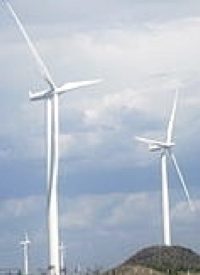
Ironworkers Local 7 in New England has a complaint against the acolytes of “green energy.” Though there is a 16-turbine wind-power project planned in Sheffield, Vermont, and a 33-turbine undertaking in Dummer, New Hampshire, no locals will do the work: Ironworkers will be brought in from out of state.
Michael Morelli, an industry analyst associated with Ironworkers Local 7, stated the union’s position: “That’s not economic development. That’s not in the state’s best interest.” Shawn Cleary, a business agent with the union, had the same take: “They made a lot of promises about how this is going to bring local jobs to local people.… We thought they would be fair and equitable to the people of New Hampshire.’’
John Lamontagne with First Wind, the Boston-based developer of the projects, explained that the company hires workers based upon their expertise. He said that the company has contracted for some services, such as building roads and constructing tower sites, with locally-based companies. Barbara Robins, a spokeswoman for the principal contractor, noted that while local companies would be used for the less specialized work, the actual work on the turbines requires extra training: “When it comes to some of this higher-end work, we do bring people from out-of-state. It’s very specialized and technical.’’
Cleary explained that the union suggested the company bring in its own people to do 25 percent of the work and hire local people do the rest. But he added, “We were willing to talk to them about any type of agreement. … They told me it’s too early to make a decision. It’s too early to make a decision. Then as of the last communication it was too late; the decision had already been made.’’ Michael Morelli said that the local union’s members had been kept from working on the project because crews were being brought in from Utah. He added, “We[‘re] trying to shame them into doing the right thing.’’
First Wind also has a project in Vermont called the Sheffield wind project. Valerie Rickert, Deputy Commissioner of the Vermont Department of Labor, indicated that she knew of only two local employees who had been hired through that agency’s placement office. One person was hired as a security guard, and the other person’s job was unknown. When the Vermont Pubic Service Board held hearings on the project, a First Wind economist advised that the construction phase would probably bring in 83 jobs. First Wind’s Lamontagne noted that more than 100 people were already working on the project, with the total number of employees expected to top out at 160 or 170 before the work is completed later this year.
The situation in Vermont and New Hampshire illustrates how government-supported “green power” hurts ordinary workers. While the logic of matching the worker to the job is hard to refute, the illogic of our federal government regulating reliable traditional energy sources out of existence in favor of unproven “green” energy” defies both economic good sense and the Constitution. The most abundant energy source that our nation has is coal. America has larger coal reserves than any other country on the planet — more than enough to meet our energy needs for the foreseeable future. Coal mining is a major job creator. In parts of America which desperately need good jobs — West Virginia, for example — environmental restrictions on coal mining are strangling the industry and turning places such as McDowell County into regions of poverty from which the young people have fled.
West Virginians are not asking for federal help. They are asking the federal government to stop destroying productive jobs. The Kentucky Coal Association reports that 30 permits to mine for coal have been withdrawn by the Obama administration over newly discovered environmental “concerns.” The situation is so bad in the coal belt of Appalachia that coal miners and their families held a rally in Washington last September to petition the administration to relax environmental restrictions.
Oil rig workers in Louisiana, Mississippi, and Texas are facing similar problems. When President Obama imposed a moratorium on drilling in the Gulf of Mexico as a reaction to the BP oil spill, the number of jobs lost was estimated at 23,000 — devastating another part of the country that also was already experiencing economic problems. The Obama administration was also highly deceptive about the experts who, the country was told, believed that a temporary ban was necessary.
The obsession with “green” and “renewable” energy appears to be a fetish of wealthy elites. Most Americans, when viewing our nation’s problems, would say that good paying jobs in the private sector (rather than poor-paying make-work government jobs) are a priority. These Americans would also say that producing more energy from domestic sources —which makes profits for American firms, keeps money from flowing out of the nation, and drives down the cost of energy — is another important priority. These citizens would surely also favor ways of raising federal revenue without raising taxes — as, for instance, lease bonuses and royalties from extraction on government lands provide.
Most of the political muscle for the statist elites who want to push a job-destroying green agenda on America has come in the past from heavily Democrat-voting workers such as coal miners in West Virginia, oil rig workers off the Texas coast, or ironworkers in New England. They are hit as hard as any other Americans by rising energy costs and the shrinking value of the dollar. Might at some point these hard-working Americans realize that union bosses and the politicians supported by their union dues are not the friends of the working man? Might they also see that a free economy in which people are paid according to their actual economic value is just what coal miners and steelworkers need to recover their part of the American Dream?



